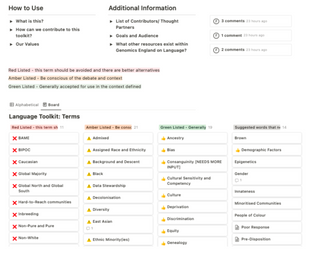The Genomics Language Toolkit
- Sophia Luu

- Nov 10, 2022
- 2 min read
Updated: Dec 16, 2023
A resource to assist genomic data scientists with reviewing the way language is reviewed and used in genomics, escpecially with terms that also have a socio-political meaning?
Client: Genomics England (in house)
Duration: 1 year (2022)
Topic: Race, Ethnicity and Ancestry in Genomics
The Brief
Langauge is always changing and context specific. ... but when we’re dealing with genomics, it’s essential to understand when context switching causes bias, unclear science and siloes in problem solving. This is particularly true for words relating to race, ethnicity and ancstry in genomics.
The Outcome
A Digital toolkit with co-created definitions with a range of experts (Doctors, genetic councillors, bioinformaticians, activists, patients and social scientists). Hosted on Notion so it can be easily updated.
Printed booklet version of the document to exist in physical spaces in the office.
Educational video content and posters used to onboard new staff, in a range of formats which account for different levels of scientific understanding
A review panel set up annually with the collaborators to update terminology
Download the Quick Guides
Research and Methodology
Over the course of 5 months, I held 18 in-depth sessions with: 5 patient advocacy groups, 5 researchers (science and social), 5 population geneticists/ bioinformaticians, 3 clinicians and genetics counsellors. A lot of careful planning and ethical consideration was taken into thinking about the responsibility of communicating the histroy of eugenics in genetics, and the way we could keep participants safe when holding such personal and scientific discussions.
Key Insights
Many of the traditional terms used to define race, ancestry and ethnicity in genomics are outdated and unscientific. While there is a recognition from genomic experts that this is the case for socio-political terminology, there is less of an understanding of how these sentiments can cause assumptions that affect genetic science. Gentetics experts tend to 'codeswitch' when using words relating to race, ancestry and ethnicity in a social or scientific context, which is dangerous as these contexts are never fully defined.
The Team
Sophia Luu - Project lead and Design Research
Semine Long-Callesen, History of Science Researcher
Dr Sam Tallman - Genomic Data Scientist
Dr Ed Hollox - Genomic Data Scientist
Mahantesh Biradar, M.Tech - Genetic Epidemiology and Research Fellow
Dr. Anna Need - Human Geneticist
Amanda Pichini -Genetic Counsellor
Lyra Nightingale - Ethics Lead
Aman Ali - Community Organiser, Muslim Engagement and Development
Dr Furaha Asani - Public Scholar and Writer
Dr Sasha Henriques - Principal Genetic Counsellor
Salim and Hasha Shaikh, Summaiya - Research & Projects Directors, Smartlyte/ Get Families Talking
Dr Alice Popejoy - Reseacher
Ewan Birney - Director General
Dr Matteo Fumagalli, Clinician
Melanie Martin, Copywrityer
Dr Daniel Rhodes - Senior Bioinformatician
Dr Maxine Mackintosh - Diverse Data programme lead
Thuy Nguyen - Senior Bioinformatician
Diksha Srivastava - Policy lead













